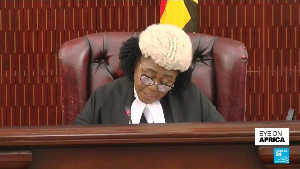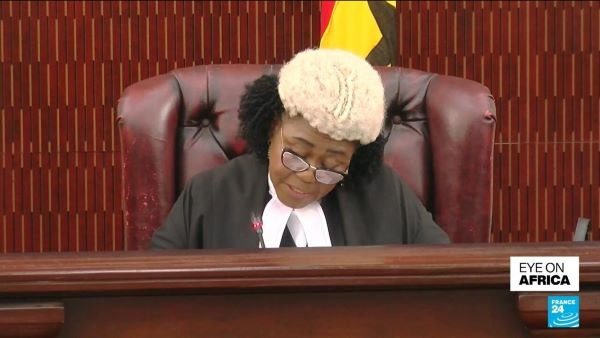 The Chief Justice, Gertrude Torkornoo
The Chief Justice, Gertrude Torkornoo
The Supreme Court has outlined the reasons behind the decision to uphold the suit by Majority Leader Alexander Afenyo-Markin.
In a judgment backing a suit brought before it by the Majority Leader on November 12, 2024, the court stated that Articles 97(1)(g) and (h) of the Constitution apply only to the current term of Parliament.
It noted that these provisions do not apply to future terms, such as when an MP contests elections under a different political affiliation.
The apex court has indicated that a Member of Parliament can only vacate their seat if they change their political identity and remain in Parliament with the new identity.
The court also noted that an MP’s seat is vacated if they switch parties within Parliament while continuing to serve as a member of the new party.
“It follows from the above, therefore, that the only plausible conclusion which must necessarily flow from a holistic and contextual reading of Article 97(1)(g) and (h) is that an MP’s seat shall be vacated upon departure from the cohort of his elected party in Parliament to join another party in Parliament while seeking to remain in that Parliament as a member of the new party,” the court held.
The ruling further indicated that, similarly, an independent MP who joins a political party will have to vacate the seat originally held as an Independent Member.
It stated that the constitutional provisions in question should be understood in the context of the current parliamentary term and are not intended to cover future electoral processes.
“Consequently, Article 97(1)(g) and (h) must be understood within their contextual framework, with no implicit or explicit indication that they pertain to future electoral aspirations or intentions that would materialize in subsequent terms, such as an MP contesting under a different ticket in the next election cycle,” the court held.
Justices on the majority side were the Chief Justice, Justice Gertrude Sackey Torkornoo, and Justices Mariama Owusu, Samuel Kwame Adibu-Aseidu, Ernest Yao Gaewu and Yaw Darko Asare, while Justices Avril Lovelace Johnson and Issifu Omoro Tanko Amadu, dissented views.
Background
The controversy arose after the Supreme Court stayed the Speaker’s decision to declare four seats vacant. This decision followed actions by the affected MPs, who had decided to “cross the carpet” by filing to contest the December 7, 2024, parliamentary elections in different capacities—either as independents or on other political party tickets.
This move diverged from the grounds on which these MPs were originally elected to Parliament.
The seats affected include those held by Cynthia Morrison (Agona West), Kwadjo Asante (Suhum), Andrew Amoako Asiamah (Fomena), and Peter Kwakye Ackah (Amenfi Central).
The dispute has also led to a standoff between the two sides of Parliament over which party holds the Majority. While the Supreme Court’s ruling places the NDC in the Minority, the Speaker’s decision positions the NPP in the Minority.
The core contention in this case centres on whether the Supreme Court has the authority to overrule parliamentary decisions.
Read the full judgement below:
JKB/ ADG
You can watch today’s compilation of the Twi news below:
